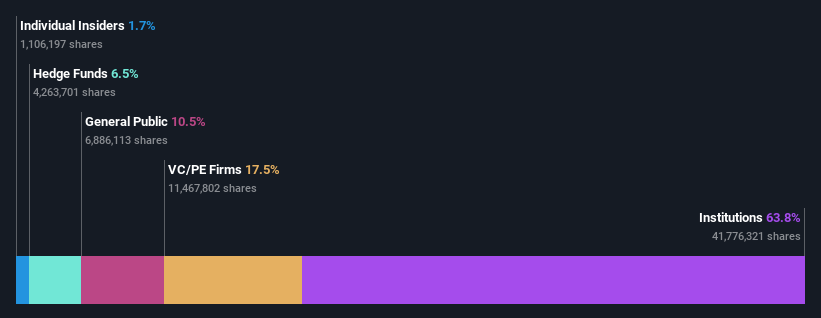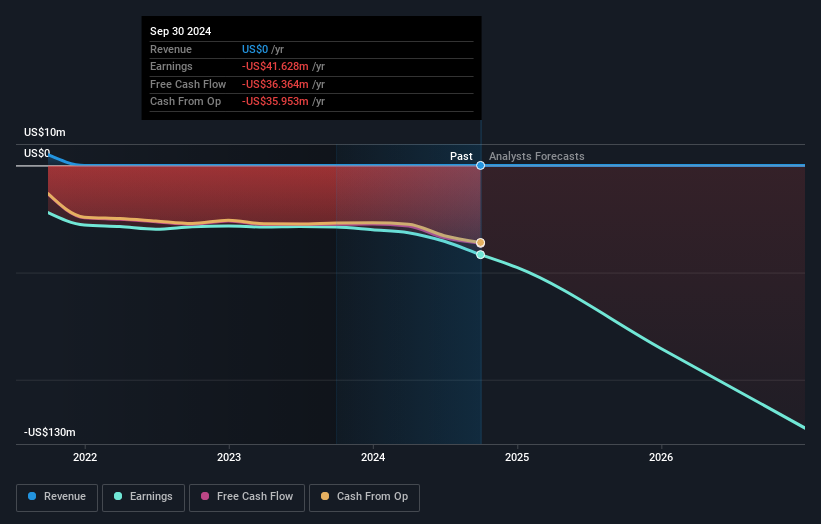- United States
- /
- Biotech
- /
- NasdaqCM:RGLS
Institutional investors may overlook Regulus Therapeutics Inc.'s (NASDAQ:RGLS) recent US$12m market cap drop as long-term gains remain positive
Key Insights
- Significantly high institutional ownership implies Regulus Therapeutics' stock price is sensitive to their trading actions
- 56% of the business is held by the top 6 shareholders
- Analyst forecasts along with ownership data serve to give a strong idea about prospects for a business
Every investor in Regulus Therapeutics Inc. (NASDAQ:RGLS) should be aware of the most powerful shareholder groups. We can see that institutions own the lion's share in the company with 64% ownership. In other words, the group stands to gain the most (or lose the most) from their investment into the company.
No shareholder likes losing money on their investments, especially institutional investors who saw their holdings drop 11% in value last week. Still, the 14% one-year gains may have helped mitigate their overall losses. But they would probably be wary of future losses.
Let's delve deeper into each type of owner of Regulus Therapeutics, beginning with the chart below.
Check out our latest analysis for Regulus Therapeutics

What Does The Institutional Ownership Tell Us About Regulus Therapeutics?
Institutions typically measure themselves against a benchmark when reporting to their own investors, so they often become more enthusiastic about a stock once it's included in a major index. We would expect most companies to have some institutions on the register, especially if they are growing.
Regulus Therapeutics already has institutions on the share registry. Indeed, they own a respectable stake in the company. This implies the analysts working for those institutions have looked at the stock and they like it. But just like anyone else, they could be wrong. When multiple institutions own a stock, there's always a risk that they are in a 'crowded trade'. When such a trade goes wrong, multiple parties may compete to sell stock fast. This risk is higher in a company without a history of growth. You can see Regulus Therapeutics' historic earnings and revenue below, but keep in mind there's always more to the story.

Since institutional investors own more than half the issued stock, the board will likely have to pay attention to their preferences. It looks like hedge funds own 6.5% of Regulus Therapeutics shares. That's interesting, because hedge funds can be quite active and activist. Many look for medium term catalysts that will drive the share price higher. Federated Hermes, Inc. is currently the largest shareholder, with 20% of shares outstanding. In comparison, the second and third largest shareholders hold about 9.9% and 7.6% of the stock.
On further inspection, we found that more than half the company's shares are owned by the top 6 shareholders, suggesting that the interests of the larger shareholders are balanced out to an extent by the smaller ones.
While it makes sense to study institutional ownership data for a company, it also makes sense to study analyst sentiments to know which way the wind is blowing. Quite a few analysts cover the stock, so you could look into forecast growth quite easily.
Insider Ownership Of Regulus Therapeutics
The definition of company insiders can be subjective and does vary between jurisdictions. Our data reflects individual insiders, capturing board members at the very least. Management ultimately answers to the board. However, it is not uncommon for managers to be executive board members, especially if they are a founder or the CEO.
I generally consider insider ownership to be a good thing. However, on some occasions it makes it more difficult for other shareholders to hold the board accountable for decisions.
Shareholders would probably be interested to learn that insiders own shares in Regulus Therapeutics Inc.. As individuals, the insiders collectively own US$1.8m worth of the US$106m company. Some would say this shows alignment of interests between shareholders and the board, though we generally prefer to see bigger insider holdings. But it might be worth checking if those insiders have been selling.
General Public Ownership
The general public, who are usually individual investors, hold a 11% stake in Regulus Therapeutics. While this size of ownership may not be enough to sway a policy decision in their favour, they can still make a collective impact on company policies.
Private Equity Ownership
With a stake of 18%, private equity firms could influence the Regulus Therapeutics board. Some investors might be encouraged by this, since private equity are sometimes able to encourage strategies that help the market see the value in the company. Alternatively, those holders might be exiting the investment after taking it public.
Next Steps:
While it is well worth considering the different groups that own a company, there are other factors that are even more important. Case in point: We've spotted 3 warning signs for Regulus Therapeutics you should be aware of, and 2 of them are a bit unpleasant.
If you are like me, you may want to think about whether this company will grow or shrink. Luckily, you can check this free report showing analyst forecasts for its future.
NB: Figures in this article are calculated using data from the last twelve months, which refer to the 12-month period ending on the last date of the month the financial statement is dated. This may not be consistent with full year annual report figures.
New: AI Stock Screener & Alerts
Our new AI Stock Screener scans the market every day to uncover opportunities.
• Dividend Powerhouses (3%+ Yield)
• Undervalued Small Caps with Insider Buying
• High growth Tech and AI Companies
Or build your own from over 50 metrics.
Have feedback on this article? Concerned about the content? Get in touch with us directly. Alternatively, email editorial-team (at) simplywallst.com.
This article by Simply Wall St is general in nature. We provide commentary based on historical data and analyst forecasts only using an unbiased methodology and our articles are not intended to be financial advice. It does not constitute a recommendation to buy or sell any stock, and does not take account of your objectives, or your financial situation. We aim to bring you long-term focused analysis driven by fundamental data. Note that our analysis may not factor in the latest price-sensitive company announcements or qualitative material. Simply Wall St has no position in any stocks mentioned.
About NasdaqCM:RGLS
Regulus Therapeutics
A clinical-stage biopharmaceutical company, engages in the discovery and development of drugs that targets microRNAs to treat a range of diseases in the United States.
Flawless balance sheet with moderate growth potential.
Market Insights
Community Narratives





